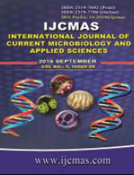


 National Academy of Agricultural Sciences (NAAS)
National Academy of Agricultural Sciences (NAAS)

|
PRINT ISSN : 2319-7692
Online ISSN : 2319-7706 Issues : 12 per year Publisher : Excellent Publishers Email : editorijcmas@gmail.com / submit@ijcmas.com Editor-in-chief: Dr.M.Prakash Index Copernicus ICV 2018: 95.39 NAAS RATING 2020: 5.38 |
The shelf life period is the main criteria for every food to be fresh and edible for consumption. The main objective of this study is to enhance the durability of fruits so as to store the fruits fresh, import and export without getting spoiled by atmospheric pathogens, moisture, etc which are the route cause for food spoilage. The resins of Prunus amygdalus dulcis and Acacia nilotica were analysed to use as an alternative to waxes that are being coated for preservation. Differential scanning calorimetric analysis and thermogravimetry analysis of the resins showed the stability and degradation of the resins. Results show that resins were stable up to 270-280ËšC and hence climatic temperatures will not have any effect on the resins coated on the fruits. Toxicity studies were performed to check the safe levels of the resins and the resins of Prunus amygdalus dulcis and Acacia nilotica possessed 0% and 10% mortality respectively. The fruits were coated with the resins to check their activity to increase their shelf life. It was observed that the fruits coated with Prunus dulcis gum were more desirable compared to those coated with Acacia nilotica gum.
 |
 |
 |
 |
 |